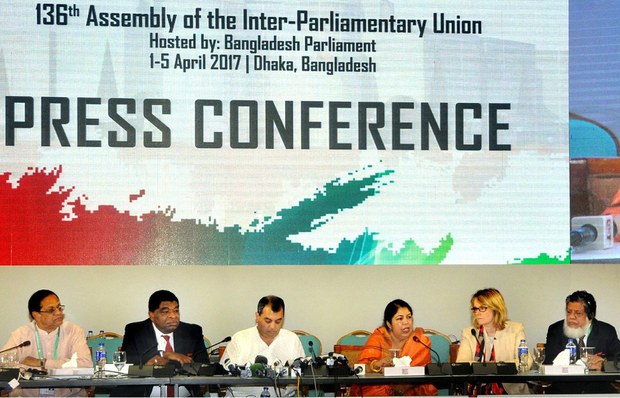Bangladesh: Dhaka Meeting of Lawmakers from Across Globe Tackles Terrorism
2017.04.05
Dhaka
 Shirin Sharmin Chowdhury (third from right), the speaker of Bangladesh’s parliament and chairwoman of the 136th Inter-Parliamentary Union Assembly, briefs reporters at the end of the five-day conference in Dhaka, April 5, 2017.
Shirin Sharmin Chowdhury (third from right), the speaker of Bangladesh’s parliament and chairwoman of the 136th Inter-Parliamentary Union Assembly, briefs reporters at the end of the five-day conference in Dhaka, April 5, 2017.
A five-day meeting of parliamentarians from 134 countries ended in the Bangladeshi capital on Wednesday with MPs urging member-governments to adopt a collective strategy for countering terrorism, among other mutual concerns.
The 136th Assembly of the Inter-Parliamentary Union delegates from six continents met in Dhaka to discuss a range of issues including working together to promote sustainable development and address women’s rights and extreme social inequalities. Parliamentarians said member-countries need to work collectively to combat terrorism.
Saber Hossain Chowdhury, an MP from host country Bangladesh who serves as the IPU president, said its 17-member executive committee had hammered out a strategy for countering violent extremism. India, Thailand, Malaysia and Indonesia are among Asian members of the IPU.
“For the first time, we at the executive committee meeting devised a strategy to prevent violent extremism. Now, we have the outline of the strategy. We will execute the strategy in the coming years,” Chowdhury told BenarNews after the Dhaka conference’s concluding session.
“Our focus is prevention,” Chowdhury said. “We, as the parliamentarians, will try to identify the root causes and address those root causes, whether through allocation of resources or whether through policies or legislation. That will be our work.”
The lawmaker’s home country has been gripped by terrorist attacks, including suicide bombings within the past month, murders of secular bloggers and minorities over the past few years, and a terrorist siege of a café in Dhaka that left 20 hostages, mostly foreigners, dead in July 2016.
The IPU conference opened amid heightened security in Dhaka and as police were ending the last of four anti-terrorist raids in the northeast spanning a week, during which 21 people – 10 militants among them – were killed.
Since the café siege, at least 59 suspected militants have been killed in raids, gunfights with security forces and suicide attacks, including during the last four raids in two northeastern districts.
“In Bangladesh, the government has been neutralizing the militants with preemptive attacks at the dens through intelligence reports. So, the government focus is to take measures so that they [the militants] cannot attack,” Chowdhury said.
Despite the anti-terror crackdown, Bangladesh’s government has not been able to solve the root-causes of the domestic terrorist threat, and a more comprehensive approach is needed, the MP said.
“Previously, we thought, in the Bangladesh context, that poor family members from rural areas and the Madrasa students have been involved in militancy. Now, we see that the youths who grew up in cities and were even from well-to-do families have become militants,” he said.
He was referring to cases of well-educated youths from affluent families who were reported missing last year by Bangladeshi authorities. Some of the young men who carried out the terrorist attack at the Holey Artisan Bakery café were from the country’s upper class, officials said.
Sameerah Ali Musawi, an MP from Iraq, whose government is battling the extremist group Islamic State – which claimed responsibility for the café attack in Dhaka – agreed that a collective strategy was needed to end the scourge of terrorism worldwide.
“We, the Iraq delegation, agree that the governments are not doing enough to stop violent extremism. The MPs have a role to play,” she told BenarNews, adding, “We need regional and global cooperation to fight and eliminate terrorism.”
But to win the fight against radicalism and violent extremism, governments need to understand what is behind it and how they can stop it at the roots, said Rebecca Kadaga, the speaker of Uganda’s parliament.
“We need preemptive campaigns against extremism. For instance, we have to see why a child from a wealthy family goes to fight for ISIL,” she said, using another acronym for IS.







